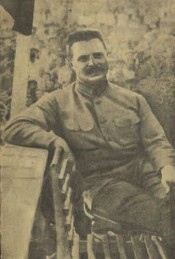
Presidential Library marks140th anniversary of Mikhail Frunze
On February 2, 2025, the 140th anniversary of the birth of Mikhail Vasilyevich Frunze will be celebrated. Frunze was a prominent Russian revolutionary, statesman, and military leader. During the Civil War in Russia, he served as the commander of the Red Army and Chairman of the Revolutionary Military Council. He also served as People's Commissar for Military and Naval Affairs in the USSR.
To commemorate this significant event, the Presidential Library is updating its electronic collection Persons of Russia with new materials about Mikhail Frunze. These materials include archival documents, memoirs from his contemporaries, and photographs that shed light on his life and achievements. Additionally, there are historical studies that provide a deeper understanding of his role in Russian history.
One of the most interesting aspects of Mikhail Frunze's life is his time spent in prison. In one of his questionnaires, which is available in the publication Mikhail Vasilyevich Frunze: A Brief Biographical Sketch (1942), he reported that he had spent a total of nine years in prison, almost a quarter of his life. This includes time spent as a prisoner, in penal servitude, and in exile. He was sentenced to death twice for his revolutionary activities and was wounded in battle more than once. The cause of his death is still a matter of debate to this day.
Mikhail Frunze did not have a military education, but he is remembered as an outstanding military leader. He did not specialize in the art of diplomacy, yet it was he who was tasked with establishing and improving relations between Soviet Russia and Turkey at the end of 1921.
In February 1919, Mikhail Vasilyevich Frunze, a former student at the St. Petersburg Polytechnic Institute and a revolutionary (using the party pseudonyms Mikhailov and Trifonych), led the 4th Army of the Workers' and Peasants' Red Army as a member of the Russian Communist Party (b). He later commanded troops on the Eastern and Turkestan fronts, where the Red Army fought victoriously against Kolchakite forces and advanced eastward to the Urals under his leadership.
In 1920, Frunze led troops against the Emir of Bukhara and General Wrangel, and after taking Crimea he appealed to Wrangel's officers and soldiers, offering them full pardon if they surrendered their arms and joined the Soviet government. However, the offer was rejected.
From the end of 1920 to August 1921, Mikhail Frunze fought against the Makhnovists and the Petliurist forces, eliminating banditry in Ukraine and winning the battle. In the period from December 1920 to March 1924, he served as the commissioner of the Revolutionary Military Council of the Republic of Ukraine, commanding the troops in Ukraine and Crimea. At the same time, he was a member of the Politburo of the Central Committee of the Communist Party of Ukraine and the Deputy Chairman of the Council of People's Commissars.
Mikhail Vasilyevich was often referred to as the most successful commander during the Civil War. Even his enemies had to acknowledge his outstanding abilities. In an article about Frunze, an English magazine wrote: "At the age of 34, he defeated Admiral Kolchak, who was a very skilled combat leader himself. His victory over General Wrangel shows that he is a highly competent individual." Klim Voroshilov quoted an assessment given by a senior military expert, a former general from the tsarist era: "From the first days of his command, he showed great potential. He proved that he could lead an army even though his career was nearing the end of his military life and that of other specialists". Mikhail Frunze began to carry out his duties brilliantly, in the fullest sense of the word. He followed the rules and laws of military science, of which he had some theoretical knowledge, but his military instinct allowed him to put them into practice.
Years of imprisonment, a fierce struggle on the battlefields of the Civil War, hard work as deputy and later chairman of the Revolutionary Military Council of the USSR, People's Commissar for Military Affairs, and Chief of Staff of the Red Army, as well as head of the Military Academy of the Red Army – all these experiences could not help but affect Frunze's health.
He didn't enjoy going to the doctor, and when he was suffering from stomach pains, he tried to self-medicate with soda. This didn't cure him, but it provided temporary relief. He would tell his relatives with an embarrassed smile that he believed in the power of soda. However, in 1925, he still needed to go to the hospital. On October 26, he wrote to his wife, saying that the end of his trials had come and that the day after tomorrow he would undergo surgery.
After the surgery, his condition worsened, and on October 29, Stalin and Mikoyan arrived at the hospital to visit him, but were not allowed to see him. Stalin left a note for him: "My dear friend, I was at your bedside today at 17:00. Rozanov, Mikoyan and I wanted to come see you, but your ulcer wouldn't allow it. We had to respect their wishes. Don't worry, my friend. It will be fine. We'll come again, we'll come again... Koba."
On November 1st, Soviet newspapers were published with mourning frames, and the radio reported that Mikhail Vasilyevich Frunze, Chairman of the Revolutionary Military Council of the USSR, had died of cardiac arrest after surgery on the night of October 31st.
Learn more about the funeral of Mikhail Frunze in Elena Guy's book The Red Commander, Mikhail Vasilyevich Frunze, published in 1926.





